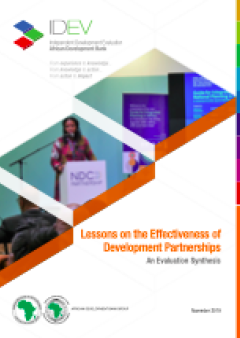
Lessons on the Effectiveness of Development Partnerships: An Evaluation Synthesis
Given the importance of partnerships for the Bank, IDEV is for the first time undertaking a comprehensive thematic evaluation of the Bank’s partnerships. This Evaluation Synthesis on Partnerships constitutes the first phase. The purpose of the evaluation synthesis is to facilitate learning, both within and outside the AfDB, by broadly assessing the knowledge accumulated in recent years on the development effectiveness of partnerships and donor coordination activities. It brings together evaluative evidence and research from 38 studies on partnerships at the global, corporate, country and project levels in International Financial Institutions (IFIs) with similar partnership objectives and institutional processes as the AfDB.
The evaluation synthesis aims to: (i) generate an overall picture of the performance of development partnerships (DPs); (ii) identify lessons relevant to the improvement of DPs going forward; and (iii) inform the ongoing comprehensive evaluation of the AfDB’s partnerships. The themes assessed by this synthesis range from the relevance and effectiveness of partnerships to their use as vehicles for resource mobilization and knowledge creation within IFIs and client countries. It also examines the efficiency and sustainability of partnerships.
The synthesis findings are:
- Partnerships provide an effective strategic and operational solution to the ever-growing mandates and activities of IFIs, especially in the context of the post-2015 development era.
- Financing partnerships are somewhat effective, as they leverage partners’ resources and reduce the transaction costs from jointly implemented projects/activities. On the other hand, non-financing partnerships are usually strategic relationships to bridge capacity gaps and play a vital role in country and regional-level policy dialogues and aid effectiveness.
- In terms of specific vehicles, co-financing is one of the most effective partnerships in delivering projects.
- Trust funds (TFs) play a critical role in the ability of IFIs to achieve development effectiveness, from capacity-building and project preparation to knowledge creation and policy coordination. However, they have proven to be challenging to govern and administer.
- Three key issues that need to be addressed to ensure more effective TFs are
- the misalignment between the multitude of TFs and core programs of the organizations;
- the weak corporate oversight and coordination; and
- the disparate monitoring and evaluation, and reporting systems.
- The level of efficiency in financial and non-financial resources (i.e., staff time) required to manage and implement DPs is considered average, albeit with variations across development institutions.
- Partnerships are considered sustainable if they combine the right mix of institutional, financial and project-level resources to maintain expected outcomes over time.
For future DPs, the synthesis has identified the following key lessons:
- DPs work best when partners are adaptive and able to respond to partnership opportunities arising from a client’s needs and priorities.
- It is important to strengthen organizational capacity to deliver on partnerships’ objectives;
- Partnerships that are mainstreamed are more likely to realize their full potential;
- Selectivity and good management contribute to value addition and the attractiveness of an organization for new partnerships;
- Weak monitoring & evaluation systems, and reporting requirements need to be improved to ensure the performance of DPs.
The synthesis concludes that partnerships have the potential to contribute to long-term development impact; however, there are significant gaps in international development cooperation between what is planned through partnerships and what has been implemented. Going forward, success will require the establishment of, and adherence to, basic rules of partnerships, which include: strong political will at the organizational level, adequate resources, and a well-designed and executed partnership strategy.
